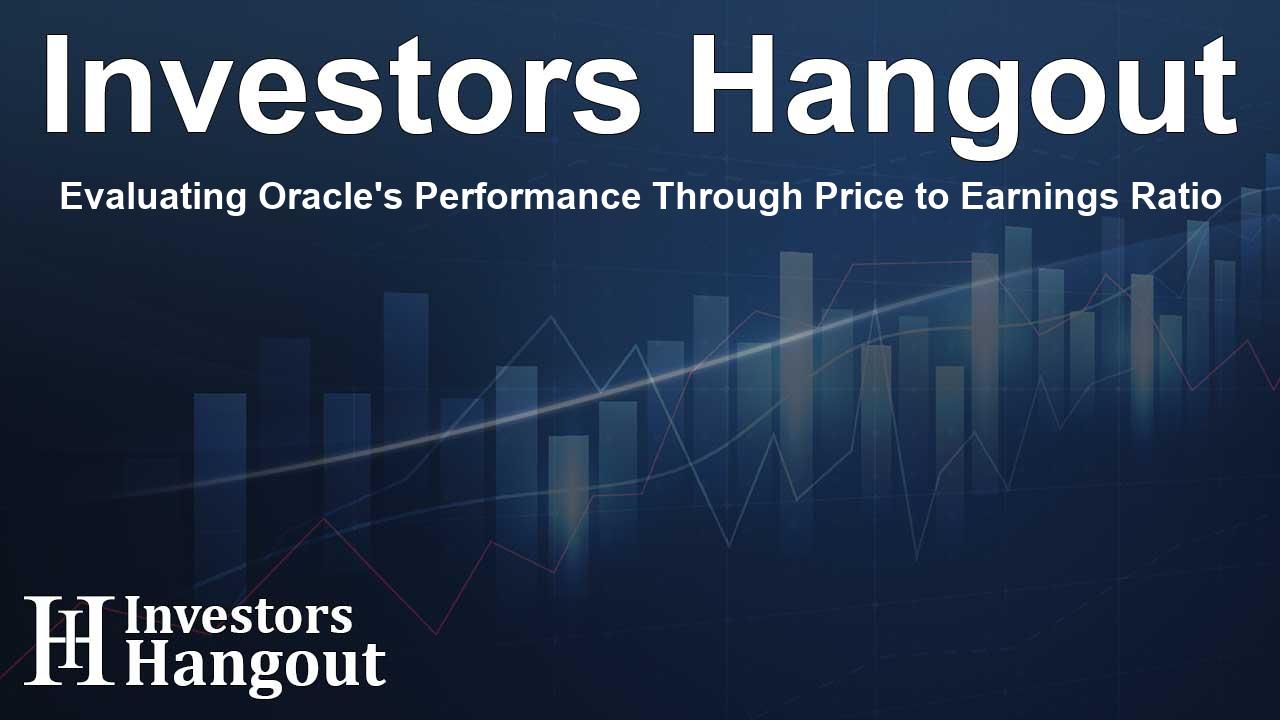Evaluating Oracle's Performance Through Price to Earnings Ratio

Understanding Oracle Inc.'s Market Position
Oracle Inc. continues to navigate a dynamic market landscape. With a current share price of $236.15, it experienced a notable 0.83% increase recently. However, a look at its performance reveals a decline of 5.77% over the past month, juxtaposed with a remarkable rise of 69.38% over the last year. This mixed performance prompts many shareholders to ponder the valuation of the stock, particularly in a time when market dynamics are in constant flux.
Comparative Analysis of P/E Ratios in the Software Sector
The price-to-earnings (P/E) ratio is a crucial metric that reflects the relationship between a company's current share price and its earnings per share (EPS). For investors, this ratio serves as a critical component in assessing a company’s current market performance relative to its historical earnings as well as the broader market indices, such as the S&P 500. A higher P/E ratio often signals that investors have high expectations for future growth, leading to considerations of whether a stock is currently overvalued.
A Deeper Look at Oracle's P/E
Oracle's P/E ratio stands at 53.97, which, when compared to the average P/E ratio of 102.0 in the software industry, raises questions about its standing among competitors. While such a lower ratio might suggest that Oracle could underperform relative to its industry peers, it may also hint at potential undervaluation perceived by the market.
Implications of the P/E Ratio for Investors
Investors should approach the use of the P/E ratio cautiously. While it may indicate potential undervaluation, a low P/E can also point to unfavorable growth prospects or ongoing financial challenges. It’s essential for investors to substitute the P/E ratio with a holistic methodology that incorporates other financial metrics, industry analysis, and qualitative data.
Broader Context and Future Considerations
In determining Oracle's future, investors are advised to analyze a variety of financial ratios alongside industry trends and internal company developments. By adopting a comprehensive investment strategy, it’s possible to mitigate risks while increasing the likelihood of fruitful investment outcomes.
The Importance of Continuous Monitoring
Continuous assessment of Oracle's performance is vital in understanding shifts in market capitalization and overall valuation. The current fluctuations underscore the importance of analyzing not just the P/E ratio but also other performance indicators, investor sentiments, and market conditions.
Frequently Asked Questions
What does Oracle's current P/E ratio indicate?
Oracle's P/E ratio of 53.97 suggests that investors may have high expectations for higher future earnings compared to the industry average.
How does Oracle's performance compare to the software industry?
Compared to the software industry’s average P/E ratio of 102.0, Oracle's ratios indicate a potentially undervalued stock when looking at industry benchmarks.
Why is the P/E ratio important for investors?
The P/E ratio helps investors gauge a company's valuation, indicating whether a stock is overvalued or undervalued based on current and expected performance.
What should investors consider alongside the P/E ratio?
Investors should also consider other financial ratios, market trends, and qualitative factors that reflect the company’s overall health and performance conditions.
How can Oracle improve its market position?
Oracle can enhance its market position through strategic innovations, improving financial stability, and consistent performance reporting, thus enhancing investor confidence.
About The Author
Contact Kelly Martin privately here. Or send an email with ATTN: Kelly Martin as the subject to contact@investorshangout.com.
About Investors Hangout
Investors Hangout is a leading online stock forum for financial discussion and learning, offering a wide range of free tools and resources. It draws in traders of all levels, who exchange market knowledge, investigate trading tactics, and keep an eye on industry developments in real time. Featuring financial articles, stock message boards, quotes, charts, company profiles, and live news updates. Through cooperative learning and a wealth of informational resources, it helps users from novices creating their first portfolios to experts honing their techniques. Join Investors Hangout today: https://investorshangout.com/
The content of this article is based on factual, publicly available information and does not represent legal, financial, or investment advice. Investors Hangout does not offer financial advice, and the author is not a licensed financial advisor. Consult a qualified advisor before making any financial or investment decisions based on this article. This article should not be considered advice to purchase, sell, or hold any securities or other investments. If any of the material provided here is inaccurate, please contact us for corrections.
